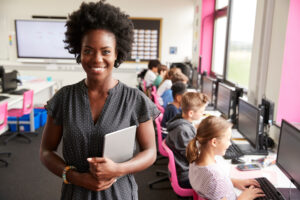
The transition from summer to the new school year can feel both exciting and challenging. We encourage educators to focus on building routines as students settle back into their classrooms. Establishing clear expectations for routines early on sets the stage for a regulated, connected new school year. Here are some valuable resources and ideas to support educators and school staff as you prepare.
Start with Your Own Routines – Transitioning from summer break can be hard. Creating reliable personal routines will help set a positive tone for your school day.
Build Predictable Rituals – Develop routines for the start, end, and throughout the school day to enhancepredictability. Structured environments support students, especially those who have experienced trauma. Consider incorporating breathing techniques, calming spaces, co-creating class norms, utilizing self-regulation cards, and taking regular brain breaks to foster a trauma-informed classroom.
Develop a Stress Management Plan – Educators often experience ongoing vicarious trauma, and your well-being is crucial before you’re expected to care for others. Craft a realistic plan for managing stress to maintain your energy and effectiveness. Self-care looks different for everyone, but having a realistic, sustainable routine is key.
Create Regular Check-ins with Colleagues – Collaborating with co-workers promotes a sense of shared purpose and allows us to work more efficiently and effectively, while we learn from one another. We are social beings, and creating routine connection times with your co-workers helps develop support networks and strengthen the whole school community
Co-create Routines with Students – For routines to be effective, they need to be clearly communicated and include student buy-in. Here are some tips on how to involve students in the process. While routines should be flexible and adaptive, maintaining stability is important. When routines differ from the norm, discuss the changes openly and anticipate implications in a developmentally appropriate manner.
Establishing routines at the beginning of the new school year requires effort, but the benefits are worth it. We hope these resources are helpful and set you and your students up for a joyful, productive school year. We are here to support you every step of the way!
To learn more about building classroom community or any other aspect of our approach check out our upcoming workshops schedule, or please contact us at hello@belongpartners.org or 206-782-1595.
